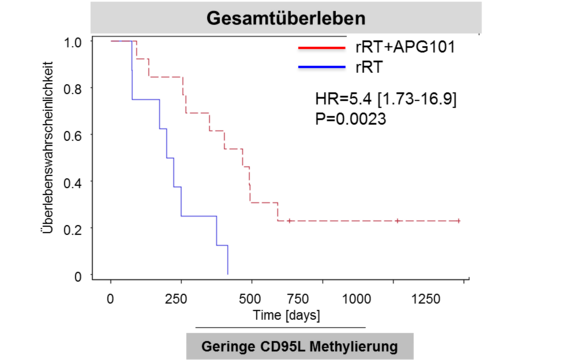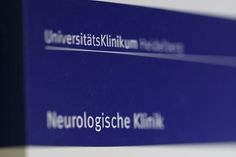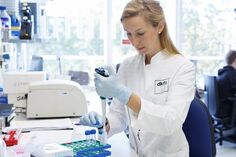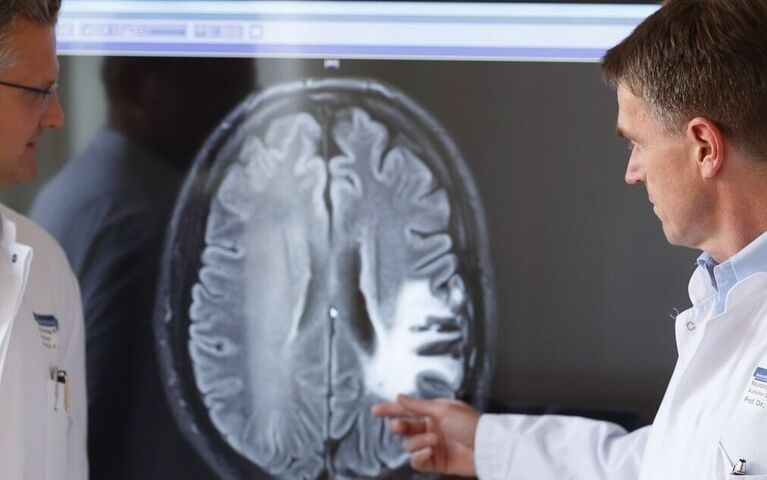Focus on neuro-oncology
We occupy a leading international position in neuro-oncology and are an integral part of the brain tumour programme of the National Centre for Tumour Diseases (NCT) in Heidelberg. Every year, we treat >3,000 outpatients and >1,000 inpatients on a specialised ward with 18 beds. Unique selling points are the range of innovative clinical studies, the option of molecular stratification and the high density of specialised staff who take on these rare but serious diseases and develop them further in basic research projects.
STRATEGY
The neuro-oncology specialisation occupies a leading international position in terms of patient numbers, basic and translational research, clinical studies and innovation. The establishment of numerous new research groups in neuropathology, molecular and clinical neuro-oncology, molecular genetics, imaging diagnostics and radio-oncology has enabled Heidelberg University Hospital, the DKFZ and the NCT to achieve a critical mass and establish neuro-oncology as a prototypical, interdisciplinary profile area. The focus offers optimal diagnostic and therapeutic options for all patients with brain tumours through scientific excellence and high standards in clinical research and clinical studies. Every year, over 3,000 patients with tumours of the central nervous system are advised and more than 1,500 patients are treated. The overriding goal is to develop better treatment methods through personalised medicine in molecular diagnostics, immunotherapy and radio-oncology.
Goals

- Development of molecular-based brain tumour diagnostics in collaboration with neuropathology
- Generation of a database based on genomic and proteomic data from the Gene Glioma Network of the German Consortium for Translational Cancer Research (DKTK)
- Definition of clinically relevant treatment outcomes for brain tumour patients with a relatively good prognosis in terms of cognition, functional level and health-related quality of life, as part of the IMPROVE-CODEL consortium funded by the BMBF (Federal Ministry of Education and Research)
- Translation of new research findings into clinical practice as part of molecularly stratified studies with targeted substances, e.g. the NCT Neuro Master Match (N2M2) umbrella study funded by HIPO, the NCT and German Cancer Aid in patients with MGMT unmethylated gioblastoma
- Proof of efficacy and practicability of personalised immunotherapy, e.g. through further development of IDH-directed immunotherapy
OVERVIEW
The Heidelberg Neurooncology Centre offers a unique, multidisciplinary infrastructure for the research, diagnosis and treatment of brain tumours and neurological diseases in adult and paediatric patients. Over 20 clinical departments and research groups at Heidelberg University Hospital, the DKFZ and NCT support the centre. Since 2007, the focus has been strengthened by the establishment of the Clinical Cooperation Unit (KKE) for Neuroimmunology and Brain Tumour Immunology (M. Platten, in cooperation with the DKFZ), the KKE Neurooncology (W. Wick, in cooperation with the DKFZ), the Junior Research Group for Brain Tumour Metabolism (C. Opitz, at the DKFZ), the Professorship for Experimental Neurooncology (F. Winkler) and the Max Eder Junior Research Group for Low-Grade Gliomas (S. Turcan) as well as through the strategic development of numerous research groups - including Neurooncology (W. Wick), Radiology (M. Bendszus, A. Radbruch), Radiation Oncology (J. Debus, A. Abdollahi), Neuropathology (A. von Deimling), Neurosurgery (C. Herold-Mende) and Neurobiology (A. Martin-Villalba). Initiated and developed by paediatric neuro-oncology, the focus area offers brain tumour patients DNA methylation analyses with 450/850K arrays and, if required, panel sequencing, which enables precise molecular diagnosis including evaluation of important individual biomarkers for prognostic and therapeutic purposes.
The overarching aim of our research is to understand the tumour biology of brain tumours and to translate new findings into clinical application in a timely manner. For example, work by the Deimling and Wick research groups has led to the development of new biomarkers and diagnostic tests for brain tumours (Wiestler Acta Neuropathol 2014; Capper Acta Neuropathol 2013; Wiestler Acta Neuropathol 2013; Wick Neurology 2013; Sahm Blood 2012; partly funded by the DKFZ HIPO programme). In collaboration with the Department of Neuroradiology (M. Bendszus, S. Heiland, P. Kickingereder, A. Radbruch and many others), we have integrated novel MRI techniques into the diagnosis and follow-up of brain tumour patients. In another recent project, multiparametric response maps were created, including advanced perfusion and spectroscopy techniques for molecular imaging and feature extraction from raw MRI data. Furthermore, members of our department (M. Platten, C. Opitz, W. Wick) have described for the first time the importance of the tryptophan metabolite kynurenine as an immunosuppressant and its cancer-promoting effect, and discovered the first known endogenous ligand of the aryl hydrocarbon receptor (Opitz, Litzenburger Nature 2011). Recently, the research groups of F. Winkler, W. Wick and M. Platten uncovered new growth and resistance mechanisms in gliomas. Membrane nanotubes proved to be the elementary building blocks of infiltrating gliomas, which form an adaptive, communicating tumour network in the brain and thus suggest that gliomas are not a focal disease but a disease of the entire brain (Osswald Nature 2015). Further research into clinical implementation in the Wick and Platten working groups concerns the development of the first predictive biomarker for older glioblastoma patients (Wick Lancet Oncol 2012).
With regard to the development of innovative clinical studies, the department has played a leading role in international studies on angiogenesis in malignant gliomas (Chinot, Wick NEJM 2014; Wick ASCO 2016). Furthermore, the clinical cooperation units of M. Platten and W. Wick have identified the mutated IDH protein as a suitable target for immunotherapy (Schumacher Nature 2014, Bunse J Clin Invest 2015) and developed a first-in-man study with a peptide-based vaccine directed against mutated IDH in highly malignant gliomas (WHO grade III/IV). A pilot study on immunotherapy (NOA-16) was initiated in Heidelberg and at several partner sites of the German Consortium for Translational Cancer Research (DKTK). Another study coordinated in Heidelberg is using peptide development within the EU Glioma Actively Personalised Vaccine Consortium (GAPVAC) for personalised immunotherapeutic treatment. The APG101 study (W. Wick, M. Platten, A. von Deimling, M. Bendzsus) was the first successful controlled study in glioblastoma recurrences with an observation period of 10 years. It investigated the soluble CD95 receptor in combination with radiotherapy and served as the basis for the development of methylation at CpG2 in the CD95 promoter as a predictive biomarker (Wick Clin Cancer Res 2014).






